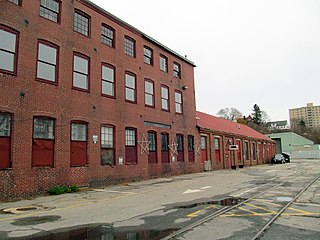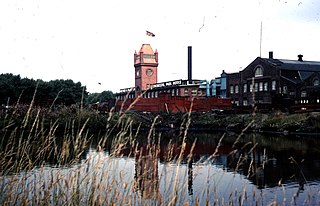
The Whitechapel Bell Foundry was a business in the London Borough of Tower Hamlets. At the time of the closure of its Whitechapel premises, it was the oldest manufacturing company in Great Britain. The bell foundry primarily made church bells and their fittings and accessories, although it also provided single tolling bells, carillon bells and handbells. The foundry was notable for being the original manufacturer of the Liberty Bell, a famous symbol of American independence, and for re-casting Big Ben, which rings from the north clock tower at the Houses of Parliament in London.

The Tredegar Iron Works in Richmond, Virginia, was the biggest ironworks in the Confederacy during the American Civil War, and a significant factor in the decision to make Richmond the Confederate capital.

ACF Industries, originally the American Car and Foundry Company, is an American manufacturer of railroad rolling stock. One of its subsidiaries was once (1925–54) a manufacturer of motor coaches and trolley coaches under the brand names of (first) ACF and (later) ACF-Brill. Today, the company is known as ACF Industries LLC and is based in St. Charles, Missouri. It is owned by investor Carl Icahn.

Daniel Adamson was an English engineer who became a successful manufacturer of boilers and was the driving force behind the inception of the Manchester Ship Canal project during the 1880s.

The Canadian Car & Foundry Company, Limited was a manufacturer of buses, railway rolling stock, forestry equipment, and later aircraft for the Canadian market. CC&F history goes back to 1897, but the main company was established in 1909 from an amalgamation of several companies and later became part of Hawker Siddeley Canada through the purchase by A.V. Roe Canada in 1957. Today the remaining factories are part of Alstom after its acquisition of Bombardier Transportation completed in 2021.

Sloss Furnaces is a National Historic Landmark in Birmingham, Alabama in the United States. It operated as a pig iron-producing blast furnace from 1882 to 1971. After closing, it became one of the first industrial sites in the U.S. to be preserved and restored for public use. In 1981, the furnaces were designated a National Historic Landmark by the United States Department of the Interior.
Accuride Corporation is a diversified manufacturer and supplier of commercial vehicle components in North America. Based in Livonia, Michigan, the company designs, manufactures and markets commercial vehicle components.

The Butterley Company was an English manufacturing firm founded as Benjamin Outram and Company in 1790. Its subsidiaries existed until 2009.

The Phoenix Iron Works, located in Phoenixville, Pennsylvania, was a manufacturer of iron and related products during the 19th century and early 20th century. Phoenix Iron Company was a major producer of cannon for the Union Army during the American Civil War. The company also produced the Phoenix column, an advance in construction material. Company facilities are a core component of the Phoenixville Historic District, a National Register of Historic Places site that was in 2006 recognized as a historic landmark by ASM International.

Newton, Chambers & Co. was one of England's largest industrial companies. It was founded in 1789 by George Newton and Thomas Chambers.

The Portland Company was established 10 November 1846 by John A. Poor and Norris Locomotive Works engineer Septimus Norris as a locomotive foundry to build railroad equipment for the adjacent Portland terminus of the Atlantic and St. Lawrence Railroad connection between Portland, Maine, and Montreal. The shops opened for business in October, 1847. Its first locomotive, the Augusta, emerged from the shops in July 1848 for delivery to the Portland, Saco & Portsmouth. Over the next several decades, the company produced in its Fore Street facilities over 600 steam locomotives as well as 160 merchant and naval vessels, railcars, construction equipment, Knox automobiles, and the like. Portland Company built the engines of the civil war side-wheel gunboats Agawam and Pontoosuc. Taking into account its other products, the company could lay claim to being one of the leading medium-to-heavy steel manufacturers in New England. The company ceased production in 1978.

ESCO Group LLC is a manufacturer of engineered metal wear parts and components for industrial applications—including mining and construction. Since 1913, the company, which is a division of Weir Group PLC, has been headquartered in Portland, Oregon, USA.

Mather & Platt is the name of several large engineering firms in Europe, South Africa and Asia that are subsidiaries of Wilo SE, Germany or were founded by former employees. The original company was founded in the Newton Heath area of Manchester, England, where it was a major employer. That firm continues as a food processing and packaging business, trading as M & P Engineering in Trafford Park, Manchester.

EJ Group, formerly East Jordan Iron Works, is an American manufacturer of iron products, headquartered in East Jordan, Michigan. The company manufactures and distributes iron construction castings, fabricated products, composite products, water distribution solutions, and other infrastructure access products for water, sewer, drainage, telecommunications, and utility networks worldwide.

The Roeliff Jansen Kill is a major tributary to the Hudson River. Roeliff Jansen Kill was the traditional boundary between the Native American Mahican and Wappinger tribes.

The Clydebridge Steelworks, also known as Clydebridge Works, is a steel works in South Lanarkshire, Scotland.

Pencoyd was a historic house and farm in Bala Cynwyd, Lower Merion Township, Montgomery County, Pennsylvania. Located along the north side of what is now City Avenue, the farm originally stretched from the Schuylkill River to Conshohocken State Road. Settled by John Roberts in 1683, his descendants owned the property for 280 years. The house was built c.1684–1690, and demolished in 1964.

USS Patrick Gallagher (DDG-127) is a planned United States Navy Arleigh Burke-class Flight IIA guided missile destroyer, the 77th overall for the class. She will be named for Lance Corporal Patrick Gallagher (1944–1967), an Irish-born Marine who earned the Navy Cross during the Vietnam War.

The Old Sugarmill is a heritage-listed former sugar mill and now apartments at Sugar House Road, Canterbury in the City of Canterbury-Bankstown local government area of New South Wales, Australia. It was designed by Woodhouse Danks and built from 1839 to 1841. It is also known as Canterbury Sugar Works, Former Hutton Premises, Australian Sugar Company Mill, Canterbury Sugar House, ASC Sugar Mill Buildings and Australasian Sugar Company. It was added to the New South Wales State Heritage Register on 2 April 1999.
The 2020 Bath shipbuilders strike was a labor strike involving shipbuilders at Bath Iron Works in Bath, Maine, United States. The strike, which started June 22, involved 4,300 members of the International Association of Machinists and Aerospace Workers. The strike ended on August 23 with the approval of a new labor contract.

















